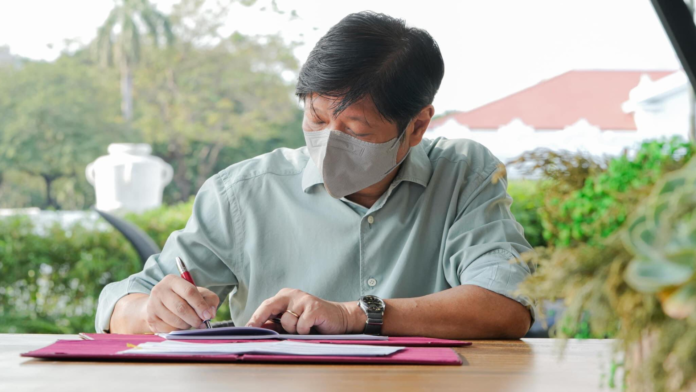President Ferdinand R. Marcos Jr. on Tuesday signed the Public-Private Partnership (PPP) Code of the Philippines and the Internet Transactions Act (ITA) of 2023.
The Presidential Communications Office (PCO) shared on its official Facebook page photos of Marcos signing the two measures into law.
The President was supposed to lead the ceremonial signing of the PPP Code and the ITA law at the Kalayaan Hall of Malacañan Palace in Manila on Tuesday afternoon.
He, however, had to cancel the Palace event after he tested positive for the coronavirus disease 2019 (Covid-19) and was advised to undergo a five-day isolation.
“Instead, President Marcos signed the two landmark bills while in isolation in his residence in Bahay Pangulo,” PCO Secretary Cheloy Garafil said in a statement. “He said the two bills show the country’s commitment and readiness to accelerate its development and to embrace the digital economy.”
Garafil said Republic Act 11966, or An Act Providing for the PPP Code of the Philippines, would establish “a stable and predictable environment for collaboration between the public and private sectors.”
The PPP Code, she said, aims to address the gaps in the infrastructure systems and also free up much-needed resources to enable the government to pursue other equally important projects and initiatives.
“The PPP Code incorporates best practices from over three decades of experience in implementing the Build-Operate-Transfer (BOT) Law, ensuring that the country build better infrastructure projects and mitigate risks during their implementation,” she added.
Meanwhile, Garafil said the passage of RA 11967, or the ITA of 2023, would provide the public with the mechanisms “to confidently embrace the digital economy.”
She said it seeks to protect online consumers and merchants engaged in Internet transactions.
The new law establishes the E-Commerce Bureau under the Department of Trade and Industry, which would spearhead the implementation of the law, as well as the Electronic Commerce Act of 2000 and the Philippine E-Commerce Roadmap.
“(The ITA law) highlights the government’s efforts to not only protect consumers and merchants but also harness e-commerce as a tool for growth and development as it upholds fair business practices, fosters innovation, and institutes effective mechanisms for dispute resolution,” Garafil said.
Malacañang has yet to release a copy of the two newly signed laws.
PPP Code to enable dev’t
The National Economic and Development Authority (NEDA) welcomed the enactment of the PPP Code.
“The PPP Code will enable much-needed development across various sectors and accelerate the delivery of public services necessary for economic growth and socioeconomic transformation,” NEDA Secretary Arsenio Balisacan said.
“With its implementation, the government can harness PPPs to finance priority programs, such as the Marcos Administration’s Infrastructure Flagship Projects (IFPs) and even social infrastructure in the education and health sectors. The law encourages leveraging private-sector expertise in process innovation, resource mobilization, and high-quality service delivery.”
Balisacan said the Marcos administration encourages investments in critical sectors to help sustain rapid and inclusive economic growth.
“To sustain rapid economic growth, generate high-quality employment opportunities, and reduce poverty sustainably, we will need massive amounts of investment in physical and human capital. Given the tight fiscal space, the private sector becomes an indispensable partner in building the foundations to propel the economy’s medium- and long-term expansion,” he said.
“Through the many game-changing reforms enacted and implemented by the present and past administrations, we aim to make the Philippines a destination of choice for local and foreign investors.”
The PPP Code aims to strengthen and institutionalize PPPs in the country further, providing a unified legal framework for all PPPs at both national and local levels.
It covers all types of arrangements, such as the BOT variants, joint ventures, and toll operations agreements.
The law also reduces transaction costs and improves the ease of doing business for PPPs.
PPP Center Executive Director, Undersecretary Ma. Cynthia C. Hernandez, expressed confidence that through the PPP Code, the government would deliver more financially viable, well-structured, and high-quality PPP projects that would significantly improve the lives of Filipinos.
“The PPP Code incorporates the best practices and lessons learned from over 33 years of experience in implementing PPPs in the country to ensure that present and future PPP projects are of high quality and can mitigate risks during implementation,” Hernandez said. (PNA)
Photo credit: Facebook/pcogovph


